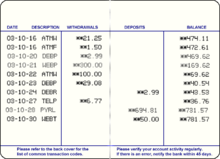Savings account
 The passbook is the traditional record of savings account transactions. | ||
| Part of a series on financial services | ||
| Banking | ||
|---|---|---|
|
|
||
|
Funds transfer |
||
|
Banking terms
|
||
Saving accounts are accounts maintained by retail financial institutions that pay interest but cannot be used directly as money in the narrow sense of a medium of exchange (for example, by writing a cheque). These accounts let customers set aside a portion of their liquid assets while earning a monetary return. For the bank, money in a savings account may not be callable immediately and, in some jurisdictions, does not incur a reserve requirement. Cash in the bank's vaults may thus be used, for example, to fund interest-paying loans.
The other major types of deposit account are the transactional account (usually known as a "checking" or "current" account), money market account and time deposit.
Regulation
In the United States, under Regulation D, 12 (CFR) §204.2(d)(2), the term "savings deposit" includes a deposit or an account that meets the requirements of Sec. 204.2(d)(1) and from under the terms of the deposit contract or by practice of the depository institution, the depositor is permitted to make up to six pre-authorized transfers or withdrawals per month or statement cycle of at least four weeks. There is no regulation limiting number of deposits into the account.
Within most European countries, interest paid on deposit accounts is taxed at source. The high rates of some countries has led to the development of a significant offshore savings industry. The European Union Savings Directive has made arrangements with many offshore financial centres for either information on interest earned to be shared with EU tax authorities or for withholding tax to be deducted on interest paid on offshore accounts, because of concerns relating to potential tax evasion. Account holders must either pay the withholding tax or disclose account holder information to relevant tax authorities.[1]
Costs
Withdrawals from a savings account are occasionally costly, and they are more time-consuming than withdrawals from a demand (current) account. However, most saving accounts do not limit withdrawals, unlike certificates of deposit. In the United States, violations of Regulation D often involve a service charge, or even a downgrade of the account to a checking account. With online accounts, the main penalty is the time required for the Automated Clearing House to transfer funds from the online account to a "brick and mortar" bank where it can be easily accessed. During the period between when funds are withdrawn from the online bank and transferred to the local bank, no interest is earned.
References
- ↑ Budden, Robert; Cumbo, Josephine (7 July 2006). "Offshore investors beat EU directive to avoid tax". Financial Times. Retrieved 28 November 2010.